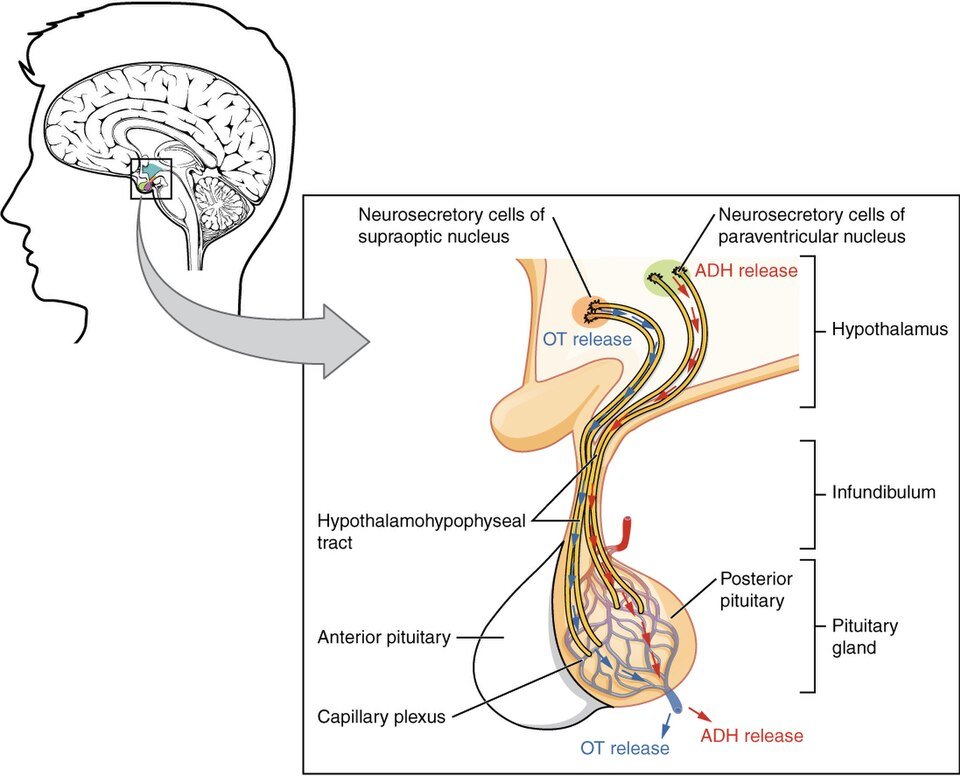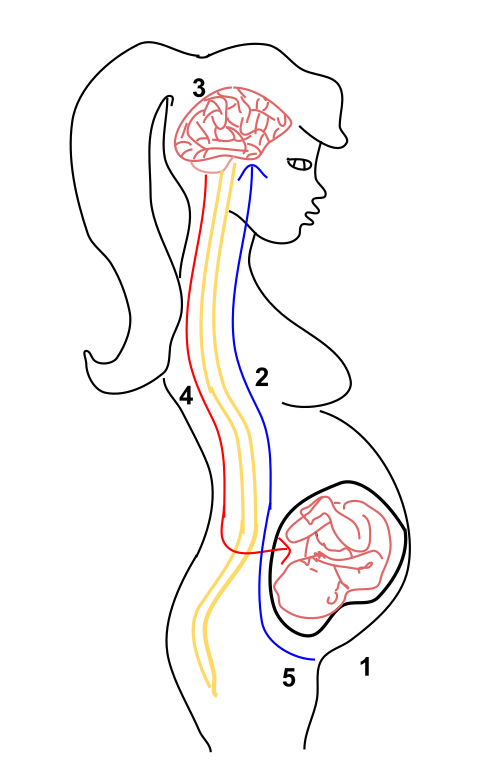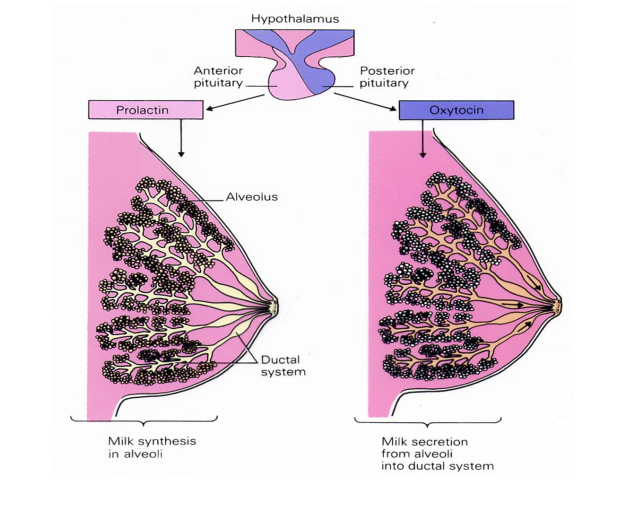IB Syllabus focus:
'- Production and roles
- Impact on social bonding and trust
- Current research and controversies'
Oxytocin is a vital hormone with wide-ranging effects in the human body, playing a critical role in various behaviours and physiological responses. This hormone is paramount for its impact on social bonding, trust, and its multifaceted roles in human interactions.
Production and Roles
Oxytocin is produced in the hypothalamus and is secreted by the posterior pituitary gland. It is often referred to as the "love hormone" or the "bonding hormone" due to its significant roles in social bonding, maternal behaviours, and pair bonding. The production of oxytocin and its effects can be better understood by exploring the localisation of function within the brain. Here are some roles it plays:

This schematic shows magnocellular neurosecretory neurons in the hypothalamus whose axons project to the posterior pituitary, where oxytocin (OT) is stored and released into the circulation. Labels include the paraventricular and supraoptic nuclei, the infundibulum, and the capillary plexus, aligning with how oxytocin reaches peripheral targets. Source.
Childbirth and Lactation: It is pivotal during childbirth as it induces labour and controls bleeding post-delivery. It also stimulates the milk ejection reflex during breastfeeding. The role of oxytocin in childbirth showcases the dynamic nature of the brain, highlighting concepts such as neuroplasticity, which illustrates the brain's ability to adapt and change.

This figure traces the positive-feedback loop of labour: fetal head pressing on the cervix triggers neural signals to the brain, oxytocin release from the pituitary, and stronger uterine contractions—further increasing cervical stretch until delivery. It visualizes oxytocin’s classic role in parturition. Source.

This figure traces the positive-feedback loop of labour: fetal head pressing on the cervix triggers neural signals to the brain, oxytocin release from the pituitary, and stronger uterine contractions—further increasing cervical stretch until delivery. It visualizes oxytocin’s classic role in parturition. Source.
Social Bonding: It aids in the formation of bonds between parents and children and between partners, influencing social recognition and promoting pro-social behaviours. The complex interplay of genetics in social bonding can be further examined through twin studies, providing insights into the hereditary aspects of social behaviours.
Emotional Responses: It regulates emotional responses and can enhance trust and empathy. The mechanism behind these emotional responses involves synaptic transmission, through which oxytocin exerts its effects on the brain and behaviour.
Current Research
Recent studies have delved deep into oxytocin’s impact on pro-social behaviours and emotions, analysing its role in anxiety, stress, and social interactions. The investigation into oxytocin's effects also touches on areas such as the study of pheromones in humans, exploring other chemical messengers that influence human behaviour and social interaction. Research on its potential therapeutic applications is emerging, specifically concerning disorders characterized by impaired social functioning such as autism spectrum disorder (ASD). Some current research also investigates its potential in treating anxiety disorders, depression, and post-traumatic stress disorder, as it might play a role in ameliorating stress and enhancing feelings of well-being and social interactions.
Controversies
The understanding of oxytocin's functions has spurred controversies mainly due to its varied effects and the complexity of its role in the body. While it is often dubbed the "love hormone," the spectrum of its impact is vast, influencing a range of behaviours from bonding and trust to aggression and in-group favouritism. Some studies contradict each other on whether oxytocin always acts as a pro-social agent or can also foster anti-social behaviours under specific conditions. The discrepancy in research findings calls for more nuanced studies to understand the context-dependent effects of oxytocin better.
Impact on Social Bonding and Trust
Oxytocin is pivotal in enhancing interpersonal relationships and social bonding. It strengthens the bond between individuals in various relationships:
Maternal Bonding: Oxytocin levels surge during pregnancy and childbirth, promoting bonding between mother and child and influencing maternal behaviours.
Pair Bonding: Elevated levels are associated with the formation of romantic relationships and the deepening of existing bonds, increasing trust and empathy within relationships.
Group Cohesion: It fosters trust and cooperation within groups, potentially leading to in-group favouritism and enhanced group coordination and cohesion.
Therapeutic Implications
Given oxytocin's role in social bonding and trust, it offers promising therapeutic applications. Studies are exploring its utility in enhancing social skills in individuals with impaired social functioning, such as those with ASD, and its potential benefits in mental health conditions related to social anxiety and trust issues. However, the exact mechanisms, optimal dosages, and administration routes are still under extensive research, and a balanced view considering potential side effects and individual variability is essential.
Applications in Psychological Research
In psychological research, oxytocin is studied for its potential to modulate social behaviours and emotional responses. Researchers administer it intranasally to observe its effects on trust, empathy, social recognition, and bonding.
Behavioural Studies: These studies analyse how oxytocin influences various behaviours, such as altruism, cooperation, and emotional recognition, revealing its multifaceted roles in shaping human interactions.
Clinical Trials: Research includes clinical trials investigating its efficacy in treating conditions characterized by social impairments, contributing valuable insights into potential therapeutic applications.
Strengths and Limitations
Oxytocin’s broad spectrum of influence presents both opportunities and challenges for researchers. It has uncovered profound insights into human behaviours, emotions, and physiological processes, opening avenues for potential therapeutic interventions. However, the variability in responses, ethical considerations in administration, and the multifaceted nature of its effects necessitate caution and meticulous design in research studies.
Ethical Considerations
Conducting studies involving oxytocin administration raises ethical concerns due to its powerful influence on emotions and behaviours. Researchers must ensure informed consent, respecting participants' autonomy, and consider the potential impacts and side effects. The long-term effects and the consequences of altering trust and social behaviours are crucial considerations, necessitating rigorous ethical scrutiny and transparency in research methodologies. The ethical considerations in animal studies provide a framework for understanding the ethical implications of research involving biological influences on behaviour.
Conclusion
Oxytocin is integral to understanding the biological underpinnings of human behaviours and emotions. Its multifaceted roles span from childbirth to social interactions, making it a focal point in psychological research. However, the complexities and ethical considerations surrounding oxytocin studies underscore the need for ongoing, nuanced research to unravel its full spectrum of influence and therapeutic potential.
FAQ
Beyond social bonding and trust, oxytocin has profound implications for learning and memory. It modulates neural plasticity, impacting memory consolidation and retrieval. Particularly in social contexts, oxytocin can enhance the encoding and retrieval of social information, fostering social recognition memory. It aids in the formation of social attachments and the learning of social cues and norms. The impact of oxytocin on learning and memory is context-dependent and varies based on individual differences and environmental factors, underlining its multifunctional role in human behaviour and cognition.
Oxytocin plays a crucial role in mitigating stress and anxiety. It acts as a neuromodulator in the brain, impacting social interaction, trust, and bonding. Research indicates that increased oxytocin levels can alleviate stress responses and reduce anxiety levels, promoting feelings of relaxation, trust, and stability. Its anti-anxiety effects are particularly pronounced in social contexts, where it can alleviate social anxiety and enhance positive social interactions. The nuances of its impact on stress and anxiety are still under exploration, providing promising avenues for therapeutic interventions in stress-related disorders.
Oxytocin offers promising therapeutic applications for a range of psychological disorders, particularly those associated with social functioning deficits, such as Autism Spectrum Disorder (ASD). Studies suggest that oxytocin administration can enhance social cognition, emotional recognition, and trust in individuals with ASD, potentially ameliorating social deficits. Additionally, its anxiolytic properties make it a candidate for addressing anxiety disorders, especially social anxiety disorder, by reducing fear and enhancing positive social interactions. The ongoing research is exploring optimal administration methods, dosages, and long-term impacts to harness oxytocin’s therapeutic potential effectively.
Oxytocin interacts intricately with various hormones and neurotransmitters to modulate behaviour. For instance, it collaborates with dopamine and serotonin to regulate mood, social interaction, and overall well-being. The synergistic effect with vasopressin particularly influences social and reproductive behaviours. While vasopressin is linked to aggression and territoriality, oxytocin tempers these effects, promoting affiliative behaviours. This dynamic interplay manifests diversely depending on individual, environmental, and contextual factors, highlighting the complex neurobiological networks governing behavioural responses.
Indeed, there are noted gender differences in oxytocin production and its subsequent impact on behaviour. Research indicates that women typically have higher baseline levels of oxytocin than men. The hormone has been associated with maternal behaviours and emotional bonding in females, playing a significant role during childbirth and breastfeeding. In contrast, it may affect males primarily in the context of relationship dynamics and stress responses. However, the overall behavioural outcomes are the result of multifaceted interactions between oxytocin and a range of other biochemical entities, environmental stimuli, and individual differences.
Practice Questions
Oxytocin, often dubbed the “love hormone,” is produced in the hypothalamus and secreted by the posterior pituitary gland. It plays a pivotal role in social bonding and trust. During childbirth and breastfeeding, it fosters maternal bonding, inducing labour and facilitating milk ejection. In relationships, it enhances pair bonding, elevating trust and empathy between partners. Moreover, oxytocin enhances group cohesion, fostering cooperation within groups. Current research delves into its myriad influences, including its potential therapeutic applications in disorders like ASD, exploring its capacity to enhance social interaction and mitigate social anxiety.
Oxytocin’s varied effects have sparked controversies, with debates on whether it solely promotes pro-social behaviour or also influences anti-social actions under specific conditions. The diverse findings necessitate nuanced, context-dependent studies to comprehend its broad spectrum of influence better. Ethical considerations are paramount due to oxytocin’s potent impact on emotions and behaviours. Obtaining informed consent is crucial, respecting participant autonomy and contemplating potential impacts, side effects, and long-term consequences of altering trust and social behaviours. These ethical facets highlight the necessity for rigorous scrutiny and transparent methodologies in oxytocin research.

